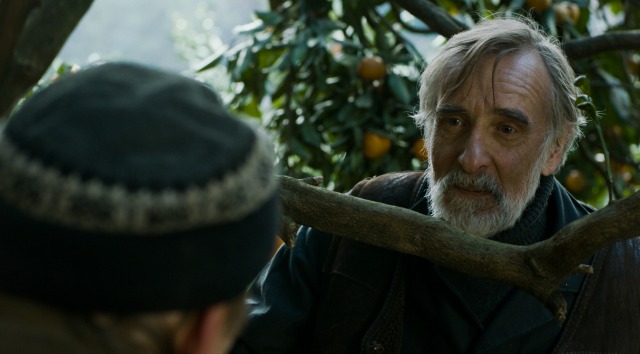Enemies Find Common Ground In 'Tangerines'
By Joel Wicklund in Arts & Entertainment on Apr 30, 2015 7:05PM

Lembit Ulfsak as Ivo in "Tangerines." (Photo courtesy of Samuel Goldwyn Films.)
Apocalypse Now screenwriter John Milius once dismissed the very notion of anti-war movies, saying they would be akin to an "anti-breathing movie." While Milius has his red meat, right-wing leanings, he has a point. War is such an inextricable part of human history, maybe even our social DNA, that movies intended to send an anti-war message may be preaching a sermon never really heard.
Which is not to say that movies about the horrors and frequent futility of war don't have value. And Tangerines, a modest and moving film from Georgian writer-director Zaza Urushadze, has plenty of value as an artfully crafted and compassionate drama. It was nominated for an Oscar as Best Foreign Language Film—a category the Academy likes to fill with serious, heavy works about serious, heavy subjects. Tangerines qualifies in the serious department, but thankfully not as much on the heavy side. It's certainly not a comedy, but in keeping the focus on relatable characters and their everyday interactions, Urushadze addresses a universal theme without crushing the audience under its weight.
The movie is set in 1992, as regional conflicts rage in the wake of the collapse of the Soviet Union. As control for the territory of Abkhazia is fought over by Georgian soldiers and Abkhazian separatists, Estonian carpenter Ivo and farmer Margus remain in their rural village, even as nearly all of their fellow neighbors have fled the region to return to their homeland. They partner in a small but successful tangerine business—Margus tending the trees and Ivo making the crates for their transport.
The war, however, is not far away and ultimately comes directly to them in the form of a shootout between Georgian and separatist forces. Several soldiers are killed, but Niko, a Georgian, and Ahmed, a Chechen mercenary fighting for the separatists, survive. Ivo—elderly but physically strong and stoic—takes them both into his home to recover. As their wounds heal, tensions between the enemies rise, with Ahmed promising to kill Niko the first chance he gets. But Ivo, firmly making the case that his home will not be a battleground, insists no violence takes place within it. In thanks to Ivo for saving his life, Ahmed agrees.
As the days go on, camaraderie slowly grows among all the men, even the sworn enemies. But the search for the missing soldiers and their military vehicles ensures that Ivo's successfully brokered ceasefire within his home does not extend far beyond its doors.
Urushadze's script is lean and unadorned, so the film relies on the nuances of the actors to fill out the sketches of their characters. That's not a problem when you have the kind of skilled performers working here. The commanding presence is Lembit Ulfsak as Ivo. His will be a new face to most American viewers, but he's considered an acting legend in his native Estonia, and based on this performance it's not hard to see why. As Ivo, he is both extremely subtle yet charismatic...a perfect center for a quiet storm of a movie.
Equally compelling is Giorgi Nakhashidze as Ahmed. His menacing brute in early scenes seamlessly transforms to a gregarious bear of a charmer, whose respect for Ivo is the key to their brief, peaceable kingdom. Mikheil Meskhi and Elmo Nüganen have less magnetic roles, but both actors make the most of their moments as Niko and Margus, respectively.
Urushadze brings some welcome moments of humor to what could have been a relentlessly grim tale, but what really lightens the movie isn't comic relief. It's the simple but effective portrait of four men getting to know each other and look outside themselves. The director makes good use of his limited settings, with the secluded woodland greenery of the tangerine grove playing against the looming shadow of war.
The climax plays out perfectly, both in terms of a sudden turn of events and the understated way the characters respond. The ending is one that many filmmakers could have easily flooded with sentimentality, but Urushadze hits just the right note for a portrait of men of few words, but deep feeling.
Tangerines. Written and directed by Zaza Urushadze. Starring Lembit Ulfsak, Giorgi Nakhashidze, Elmo Nüganen and Mikhail Meskhi. In Estonian, Georgian and Russian, with English subtitles. No MPAA rating. 86 mins.
Opens Friday, May 1 at Landmark’s Century Centre Cinema in Chicago and Renaissance Place Cinema in Highland Park.